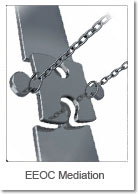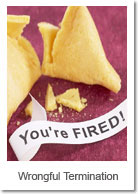EEOC Mediation
EEOC Mediation
In 1991, the EEOC began pilot mediation programs in four field offices (Philadelphia, New Orleans, Houston, and the Washington Field Office), and subsequently, pilot programs were established in all District offices. Based on the success of the pilots and the recommendations of its own ADR Task Force, the Commission concluded that mediation was a viable alternative to the traditional investigatory methods used by EEOC to resolve charges of employment discrimination, and that an ADR program should be implemented.
Since its inception, EEOC's mediation program has been successful in resolving some charges of employment discrimination. Several studies have been conducted by independent researchers to evaluate the program's effectiveness and to identify potential improvements. One survey found that parties who participated in mediation were very satisfied with the process, and that 96% of employers and 91% of charging parties would use the mediation program again if offered. (See Studies of the EEOC Mediation Program). From 1999 through 2009, almost 123,000 mediations have been held and over 85,000 charges, or almost 70 % have been successfully resolved. (See EEOC Mediation Statistics FY 1999 through FY 2009).
EEOC's program uses a combination of internal mediators employed by EEOC and external contract mediators. Field offices may also use pro bono, or volunteer, mediators. All mediators are trained in both mediation and the laws enforced by EEOC. As neutrals, the mediators apply their knowledge and experience as facilitators to explore the underlying dispute and to achieve resolutions which are mutually satisfactory to both parties. While more traditional remedies may be explored in mediation, many mediations involve creative approaches to resolving the dispute which are designed to meet the needs and interests of the parties. EEOC offers mediation soon after the charge has been filed and prior to further investigation. EEOC evaluates each charge to see if it is appropriate for mediation. Charges which EEOC has determined to be without merit are not eligible for mediation. In most instances, charges which require additional investigation on the merits are eligible. The parties may request mediation, however, at any stage of the administrative process.
At the Law Offices of Archibald J. Thomas, III, P.A. we are often consulted and retained to advise employees regarding the mediation process and to represent employees during the mediation conference. There are numerous factors that should be considered when deciding whether to participate in the EEOC or a similar mediation program offered by the Florida Commission on Human Relations. If you are considering mediation and would like to talk to one of our lawyers about this in more detail, please call us at 904-396-2322. We can answer any questions you may have about whether the EEOC or FCHR mediation program is right for you. If so, we are available to represent you during the mediation conference.
















